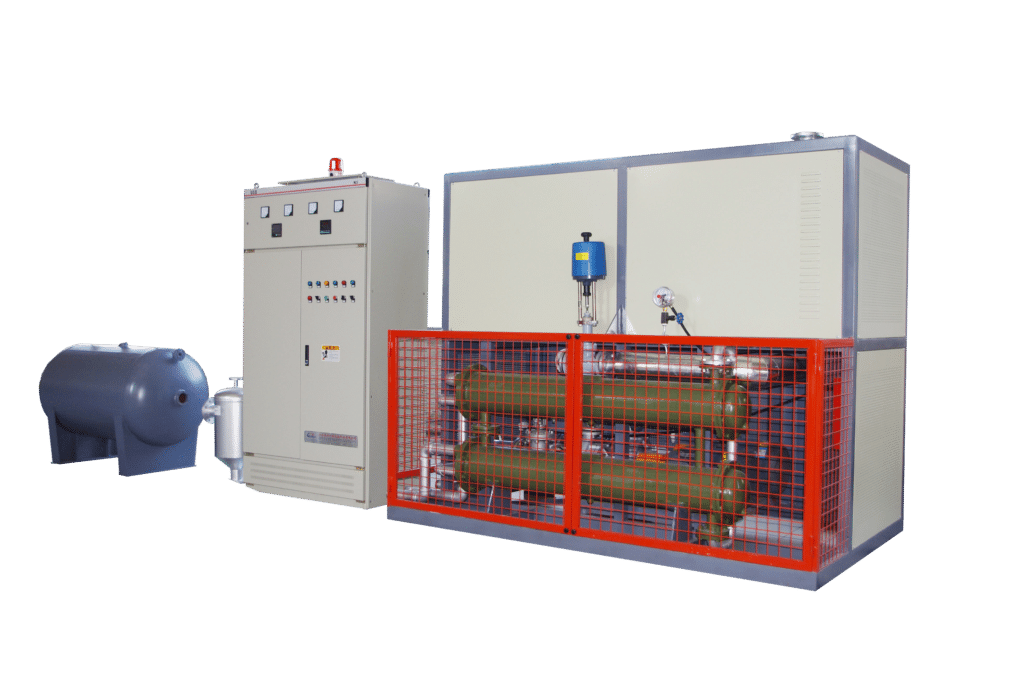“Circulation pumps are necessary or not.”Many users face a critical question when purchasing equipment.As essential heating equipment in industrial production, electric thermal oil heaters https://8ruiyan.com/en/all-organic-heat-carrier-boilers/are widely used across multiple industries including chemical processing, plastics, rubber, food processing, pharmaceuticals, and textiles. This article provides a comprehensive analysis of circulation pump functions, selection criteria, and usage considerations to support informed purchasing decisions.

Working Principle of Thermal Oil Heaters and Importance of Circulation Systems
Electric thermal oil heaters use electrical energy to heat thermal oil medium, which then transfers heat to equipment through circulation systems. A complete thermal oil heating system primarily consists of:
- Heating unit (electric heater)
- Circulation pump
- Expansion tank
- Piping system
- Control system
- Heat utilization equipment
The circulation system serves as the crucial component ensuring normal operation, delivering:
- Uniform and stable heat transfer
- Prevention of localized overheating and oil degradation
- Improved system thermal efficiency
- Extended equipment service life
Detailed Core Functions of Circulation Pumps
1. Forced Circulation Enhances Thermal Efficiency
Circulation pumps mechanically drive thermal oil flow at velocities 3-5 times faster than natural circulation, providing:
- Significantly improved heat transfer coefficients (2-3 times natural circulation)
- Reduced system warm-up time
- Uniform temperature across all heat points
- Enhanced system responsiveness
2. Preventing System Safety Hazards
Inadequate or improperly selected pumps may cause:
- Excessive heating tube surface temperatures
- Localized oil coking and carbon buildup
- Unstable system pressure
- Temperature fluctuations in heated equipment
3. Adapting to Complex Operating Conditions
Modern industrial production demands require:
- Simultaneous heating of multiple devices
- Long-distance transfer (piping exceeding 20 meters)
- Precise temperature control (±1℃)
- Frequent starts/stops or load variations
These conditions necessitate high-performance circulation pumps.
Professional Guide to Circulation Pump Selection
1. Critical Parameter Calculations
Selection requires calculating:
- Flow rate (m³/h): Q=Total system power(kW)×860/(Δt×ρ×Cp)
- Head (m): Must overcome total system piping resistance
- Operating temperature: Minimum 20℃ above maximum system temperature
2. Pump Type Recommendations
Select based on system characteristics:
- Centrifugal pumps: Suitable for most conditions
- Magnetic drive pumps: For zero-leakage requirements
- High-temperature gear pumps: For ultra-high viscosity systems
3. Material Selection Essentials
- Pump body: Cast steel or stainless steel
- Seals: High-temperature mechanical seals (graphite/silicon carbide)
- Bearings: Specialized high-temperature bearings
Solutions for Special Operating Conditions
1. Small Laboratory Equipment Solutions
For small laboratory systems (<30kW):
- Choose integrated units with built-in pumps
- Maintain 10-20% flow margin
- Prioritize variable frequency control pumps
2. Multi-loop System Design
For multiple heating circuits:
- Employ main circulation pump + branch circuit design
- Install flow control valves on each branch
- Consider variable frequency pumps for load variations
3. Energy Optimization Solutions
- Select high-efficiency motors (IE3 or above)
- Implement variable frequency control
- Install temperature-flow linkage control systems
Professional Answers to Common Questions
Q1: Can pipeline pumps replace dedicated thermal oil pumps?
Not recommended. Standard pipeline pumps lack required high-temperature resistance and seal reliability, increasing leakage and failure risks.
Q2: Are backup pumps necessary?
Depends on system criticality:
- Continuous production: Recommended
- Intermittent use: Consider rapid repair solutions
Q3: How to verify pump compatibility?
Check:
- Actual flow vs. design specifications
- Motor current within rated range
- Temperature differentials across system
Professional Maintenance Recommendations
- Routine Inspection Points
- Monitor pump vibration and noise
- Check bearing temperatures
- Inspect seal leakage
- Periodic Maintenance
- Quarterly mechanical seal inspections
- Annual lubricant replacement
- Regular coupling alignment checks
- Failure Warning Signs
- Sudden flow reduction
- Abnormal motor current fluctuations
- Unusual pump temperature increases
Conclusion: Professional Purchasing Advice
This analysis demonstrates that most industrial thermal oil systems require professional circulation pumps. When purchasing:
- Select qualified manufacturers
- Request detailed thermal calculations
- Consider future expansion needs
- Prioritize after-sales service capabilities
Final reminder: Thermal oil systems qualify as special equipment. Professional design and installation are recommended to ensure safe, reliable operation.
For further consultation, please contact our technical team for expert advice.
Whatsapp:86-19106101570
wechat:86-19106101570
email:nieyili@cnryan.com
